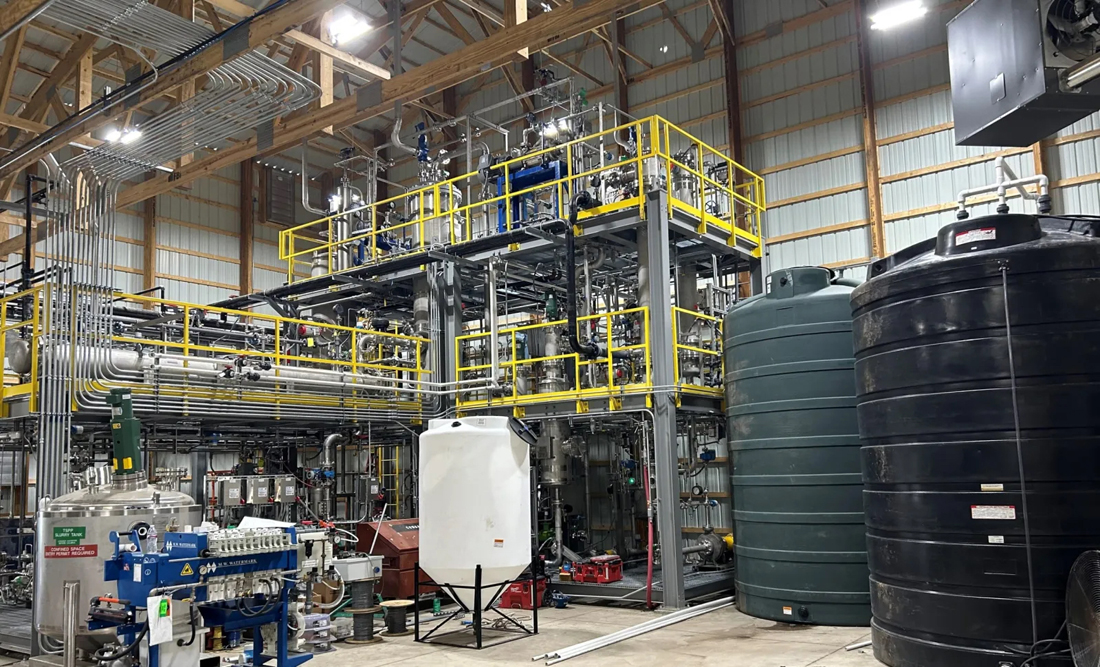According to data from J.D. Power, 869,000 EVs were sold in the U.S. in the first ten months of this year, a 56% increase over the same period in 2022, the Times reported.
EV market share has grown from 2.6% of new-vehicle sales in February 2020 to 8.5% in February 2023, with a speed bump knocking market share down to 7.3% in March, J.D. Power said.
"The top five reasons vehicle shoppers give for not considering an EV are all focused on public charging infrastructure and vehicle pricing," the data provider noted.
U.S. sales of the vehicles, which can take hours to top off, are still rising, but that growth has slowed, the New York Times reported.
In October, GM "said slowing near-term growth" had prompted it to scrap a target of building 400,000 EVs by the middle of next year, the Washington Post reported. Ford told suppliers it's cutting production of its electric F-150 Lightning pickup truck by half to 1,600 a week.
Ford will "continue to match production to demand," a Ford spokesman told the Post.
U.S. President Joe Biden is pushing for a national target of EVs making up half of new vehicle sales by the end of the decade. He has also released a Federal Sustainability Plan that aims to reach net-zero emissions from the overall operations of the federal government by 2050, including a 60% reduction in emissions by 2030.
"We have got to act. The transportation sector is the biggest part of our economy emitting greenhouse gases, and cars and trucks are one of the biggest parts of that," Transportation Secretary Pete Buttigieg said.
500,000 Public Chargers by 2030?
Improving the public charging network is vital to attracting middle-income Americans to the new vehicles, the Post reported.
Early adopters are "very accepting of faults in new technology," Nick Nigro, founder of Atlas Public Policy, which conducts research on climate and tech issues, told the Post. "Every day people aren't like that. If the charger doesn't work when you plug in, even if the issue is just you have to try again, that's not going to work."
Charging time for electric cars can vary, but for most, fast-charging means getting 80% in 15 to 30 minutes, industry resource Kelley Blue Book noted.
More than two years ago, Congress approved billions of dollars to build a national EV charging network to attract more drivers. The government is also offering tax credits for EV purchases, according to the Times.
The White House's goal is 500,000 public chargers by 2030, but researchers at the National Renewable Energy Laboratory have predicted more than 1 million charging ports by the end of the decade, the Times said.
RMI researcher Ben Shapiro said the country needs to accelerate the pace of constructing the ports.
"People certainly have this perspective that there isn't enough charging," Shapiro said. "And that I think it does hamper people's interest in EVs."
Market Set to Grow 45% From 2022 to 2027
Ohio was the first state to open a federally funded charger. There are about 43,200 EVs in the state, the Times reported.
"This industry is not going to develop unless people think they have places where they can charge their car," said Republican Ohio Gov. Mike DeWine. "We want to send the signal that not only are we getting companies in here that are building things for the future, but we want our consumers in Ohio to have the ability to benefit from that."
State officials said construction is soon set to start on six more charging stations in the next month or two. Officials expect to build about 50 charging stations by the end of 2026 to meet the program's requirements.
The global market for charging stations is expected to expand at a compound annual growth rate (CAGR) of 45% between 2022 and 2027, from US$11.9 billion to US$76.9 million, according to a report from Markets and Markets.
ioCharge Innovations Inc. wants to smooth that road and disrupt the industry by building a network that can charge vehicles up to 75% faster than current charging stations in as little as eight minutes.
"With the continuous rise in EV adoption, the demand for charging infrastructure is expected to increase exponentially, particularly in areas with high concentrations of EV owners," the report said.
"This has spurred investments in deploying additional public charging stations by governments, businesses, and other organizations to cater to the needs of EV owners. Most EV owners also install their home charging stations, further fueling the demand for charging infrastructure."
According to the report, one possible challenge being faced is having the necessary infrastructure behind the chargers in rural areas, which also might be lower in traffic.
Until the problem is fixed, EV sales could continue to stagnate, warned Jennifer Benz, deputy director of The Associated Press-NORC Center for Public Affairs Research, which collaborated with the Energy Policy Institute at the University of Chicago to put out the poll on EV adoption.
"While there is plenty of interest in purchasing an electric vehicle, the high upfront cost of owning one and concerns about the country's charging infrastructure are barriers to more people driving them," Benz said. "Policies that alleviate these concerns will be a key component of building support for an EV future." Beam Global (BEEM:NASDAQ) .
Beam Global
One company working on charging EVs in a better way is Beam Global (BEEM:NASDAQ), which focuses on providing quick deployment of renewable off-grid EV charging.
Its EV ARC systems are placed into normal parking places and take in energy through solar panels and store it in batteries to power up to six EVs at once and provide power for up to 265 miles.
"These turnkey solutions require no construction, electrical work, or utility connection," Clean Technica reported. "Immune to grid outages, the onboard battery storage ensures charging even during adverse weather or disasters, serving as vital electricity sources for first responders."
More than 1,200 units have been installed across the United States, including for the U.S. Army and the City of New York.
At the end of last year, Beam announced another order from the City of Los Angeles. "The off-grid systems will be deployed across several metro and valley locations to fuel the city's growing fleet of electric vehicles," Beam reported.
According to Reuters, about 13% of the company is owned by insiders and management, about 22% by institutions, and the rest is retail.
Top shareholders include All Cell Technologies LLC with 6.43%, Keshif Ventures LLC with 4.7%, AWM Investment Co. with 4.16%, The Vanguard Group Inc. with 3.27%, and Invesco Capital Management LLC with 2.51%.
Its market cap is US$89.66 million with 14.23 million shares outstanding. It trades in a 52-week period between US$18.89 and US$5. ChargePoint Holdings Inc. (CHPT:NYSE)
Streetwise Ownership Overview*
ChargePoint Holdings Inc. (CHPT:NYSE)
ChargePoint Holdings Inc.
Another company, ChargePoint Holdings Inc. (CHPT:NYSE), was started in 2007 and said it is working to make going electric easier with one of the largest EV charging networks and a comprehensive portfolio of charging solutions.
It also offers software and a cloud subscription platform that provides access to hundreds of thousands of places to charge in North America and Europe for charging scenarios such as home, the workplace, parking, hospitality, retail, and transport fleets of all types.
"There are approximately 41,000 public charging stations in the United States, with more than 100,000 outlets," The Verge reported. "Of course, public chargers are only half of the equation. Most EV owners do their charging overnight while parked in their driveway at home. But if EVs are to become a more attractive option to car buyers, charging stations are going to need to become more pervasive and reliable, like gas stations."
Mercedes-Benz, renewable energy company MN8, and ChargePoint are joining to install 400 fast EV charging hubs across the U.S. for about US$1 billion to try and bridge that gap. Mercedes and MN8 will split the cost.
"This is for us a strategic decision to really put our money where our mouth is and back up the direction that we're already taking over the last few years, pivoting towards electric and putting the company in a position by the end of this decade to be able to serve markets with an all-electric lineup," Mercedes-Benz's Chief Executive Officer said.
According to Reuters, about 3% of the company is with insiders and management, about 48% is with institutions, and the rest is retail.
Top shareholders include The Vanguard Group Inc. with 6.96%, Quantum Energy Partners LLC with 6.37%, BlackRock Institutional Trust Co. with 3.5%, CPP Investment Board with 1.87%, and Braemar Energy Ventures with 1.76%.
Its market cap is US$932.2 million with 418 million shares outstanding. It trades in a 52-week range of US$13.65 and US$1.69.
An Eight Minute Charge
While these companies are all working to make EV charging more user-friendly and accessible, as much as 80% of Americans still have "range anxiety" about a lack of chargers for driving electric vehicles (EVs) long distances because they fear long car charge times, according to a poll by the Energy Policy Institute at the University of Chicago this year.
As a result, U.S. sales of the vehicles, which can take hours to top off, are still rising, but that growth has slowed, the New York Times reported. This has prompted some automakers like General Motors and Ford to ease their production plans.
"Automakers have moved from rosy to reality because consumer acceptance has grown more slowly, so they are looking at kind of slowing their rollout," Michelle Krebs, an industry analyst with Cox Automotive, told the Times. The transition to EVs is "not going to be linear, and there are going to be a lot of bumps in the road," she said.
ioCharge Innovations Inc.
One company, Vancouver-based ioCharge Innovations Inc., wants to smooth that road and disrupt the industry by building a network that can charge vehicles up to 75% faster than current charging stations in as little as eight minutes.
"We're committed to providing convenient, fast, and reliable charging solutions for all-electric vehicle owners, making our network the ideal solution for reducing the range anxiety associated with long-distance travel in EVs," the company said on its website.
Charging time for electric cars can vary, but for most, fast-charging means getting 80% in 15 to 30 minutes, industry resource Kelley Blue Book noted.
"Unfortunately, that isn't the standard" for many EV owners, the website went on. "Most drivers will need at least a full day to charge a fully depleted electric car battery if they use the standard three-prong plugs found in the walls of most homes."
XFC allows for charging rates of up to 480 kW, so vehicles can be charged up to 75% faster, the company said.
"Our technology can provide a 75% charged based on a 75-kWh battery in as little as eight minutes," ioCharge said on its site.
In addition to public charging stations, the company is looking to attract private B2C (business to customer) buyers, saying the chargers could be an increasingly important amenity for homes, developments, colleges and universities, and workplaces.
"The most convenient place to charge your EV is at home, overnight," the company said. "ioCharge's specialized residential solutions will let you charge efficiently, enabling you to utilize low, overnight utility pricing during off-peak hours, saving you both time and money."
For commercial properties, XFC stations can enhance the brand image by being environmentally conscious and improving customer loyalty.
"As the demand for electric vehicles continues to grow, it is important for commercial properties to stay ahead of the curve and integrate EV charging stations as a part of their operations to help promote sustainable transportation and open up new business opportunities," ioCharge noted.
It's also a cloud-based platform connected with a downloadable mobile app to view maps of charging stations and find the best routes.
For Phase 1, ioCharge is focusing on XFC stations in Los Angeles and Vancouver. But the company said it expected to build across Canada and the United States after that.
| Want to be the first to know about interesting Special Situations and Technology investment ideas? Sign up to receive the FREE Streetwise Reports' newsletter. | Subscribe |
Important Disclosures:
- As of the date of this article, officers and/or employees of Streetwise Reports LLC (including members of their household) own securities of [ioCharge Innovations Inc.].
- [Steve Sobek]wrote this article for Streetwise Reports LLC and provides services to Streetwise Reports as an employee.
- The article does not constitute investment advice. Each reader is encouraged to consult with his or her individual financial professional. By opening this page, each reader accepts and agrees to Streetwise Reports' terms of use and full legal disclaimer. This article is not a solicitation for investment. Streetwise Reports does not render general or specific investment advice and the information on Streetwise Reports should not be considered a recommendation to buy or sell any security. Streetwise Reports does not endorse or recommend the business, products, services or securities of any company mentioned on Streetwise Reports.
For additional disclosures, please click here.




































